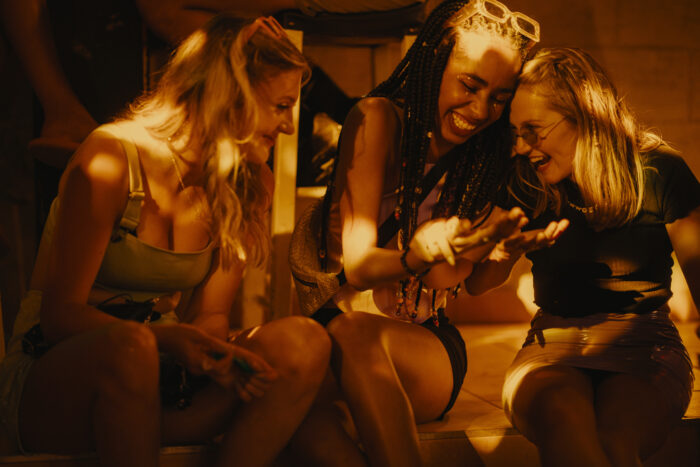How to Have Sex – Dir: Molly Manning Walker (Film Review)
How to Have Sex, the assured debut feature by British director Molly Manning Walker has a candy-coloured aesthetic. Its exterior shell, desperate hedonism, and fluorescent lights conceal what is a deeply upsetting film.
Starring: Mia McKenna-Bruce, Lara Peake, Samuel Bottomley, Shaun Thomas, Enva Lewis, Laura Ambler
“Oh Ah, Malia! Say Oh Ah, Malia!” is an anthem for young British tourists on the way to the Greek party island. Tara (Mia McKenna-Bruce), Em (Enva Lewis), and Skye (Lara Peake) are three teen best friends set on having the best girls’ holiday ever. They’ve just  taken their high school exams. The results are pending, and the trio have escaped to Malia to drink, party and hopefully have sex. This pilgrimage is a right of passage for these teens, especially for Tara, who is anxious to rid herself of the ‘stigma’ of being a virgin.
taken their high school exams. The results are pending, and the trio have escaped to Malia to drink, party and hopefully have sex. This pilgrimage is a right of passage for these teens, especially for Tara, who is anxious to rid herself of the ‘stigma’ of being a virgin.
How to Have Sex is a powerful experience in empathy; you see the world through the eyes of Tara. It’s no wonder that this candid portrait of a woman on the cusp of adulthood won the prestigious Un Certain Regard prize. The award at the Cannes Film Festival sidebar looks to the future, and Walker is a remarkable talent. Hilariously, she turned up late to the awards ceremony. The prize set Walker on an unexpected journey as 2023’s breakthrough filmmaker. Her credits as a cinematographer include A$AP Rocky‘s “Sundress” music video and the terrific Scrapper. She’d also directed the short film Good Thanks, You? which deals with a similar subject matter: a young woman is left voiceless after an assault.
Walker fondly remembers her Magaluf holidays, going on four of them between the ages of 16 and 18. How to Have Sex is based on these experiences abroad—talking shit by the pool, unlimited drinks and non-stop partying. These trips gave Walker “some of the greatest memories of my life”, but “Bad stuff happened. And we didn’t even recognise it as bad”, she says. There’s a ‘grey area’.
Tara, played by Mia McKenna-Bruce, is a revelation, bringing the awards circuit into perspective. As the film’s star, she displays a rare emotional vulnerability. Tara is still a virgin when the holiday begins and is reminded of it often by Skye. Her backhanded compliments and bad-taste jokes make you wonder how the two are friends. Despite her cattiness, Skye is symbolic of another kind of insecure girlhood. The type that strikes out when a male pays attention to a friend and not herself—jealousy is a green-eyed monster.
The trio strike up a friendship with the holidayers in the neighbouring apartment. Badger, daft but kind and Paddy, a frighteningly ordinary lad, both take an interest in Tara. Cheap booze flows freely as Tara flutters between skittish ecstasy and hushed angst. She’s absent and alone even when surrounded by others. Despite pursuing a cursory character, Em is the only one who takes notice of her inner turmoil. But she’s often lost in her own world, trying to forget the exams that define whether or not she gets into veterinary medicine. Despite his more sensitive demeanour, Badger knows that Paddy, his friend and self-assured player, is a “nightmare of a guy.” Badger is aware that something between Tara and Paddy has happened, but he doesn’t call out his behaviour or do anything to protect her.
Paddy pressured Tara into having sex on the beach. She’s lost her virginity, but it’s clearly not what she wanted. Tara said “No” multiple times and gave non-verbal cues. Her discomfort is obvious. Tara relents and says, “Yes”. Paddy has technically secured consent. But a binary understanding of consent as either “Yes” or “No” distorts what sex should be: ethical and pleasurable for all parties involved. The film’s deceptive title, How to Have Sex, suggests that it’s an instruction manual. Rather, the film is an education in consent.
Paddy is a consequence of a society where women are reduced and degraded into objects that men need to conquer sexually. How many ‘points’ can he score? “Round two” is harrowing; many women may find it triggering. 1 in 3 in Aotearoa have experienced sexual assault. There is no ‘grey area’ in this second encounter. It is an indictment of rape culture and the environments which enable sexual violence.
Tara is shell-shocked. She doesn’t have the vocabulary needed to articulate what has happened to her. A culture of victim blaming also means that Tara doesn’t feel comfortable telling Sky and Em, her closest friends, about the rape. Tara attempts to lose herself in a nightclub; she climbs onto a platform and dances erratically. The deafening, aggressive bass lines are threatening. Flickering lights are discombobulating, an overload of blue. Walker crafts an astonishingly intimate scene where an ocean of sweaty bodies and bumping music fade into the night, leaving Tara alone. Captured with a dream-like quality, Walker directs this scene with staggering maturity and confidence. Dozens of people may surround Tara, but she’s never been more alone—it’s painful to witness this anguish, which many women will relate to.
Thomas Giblin
